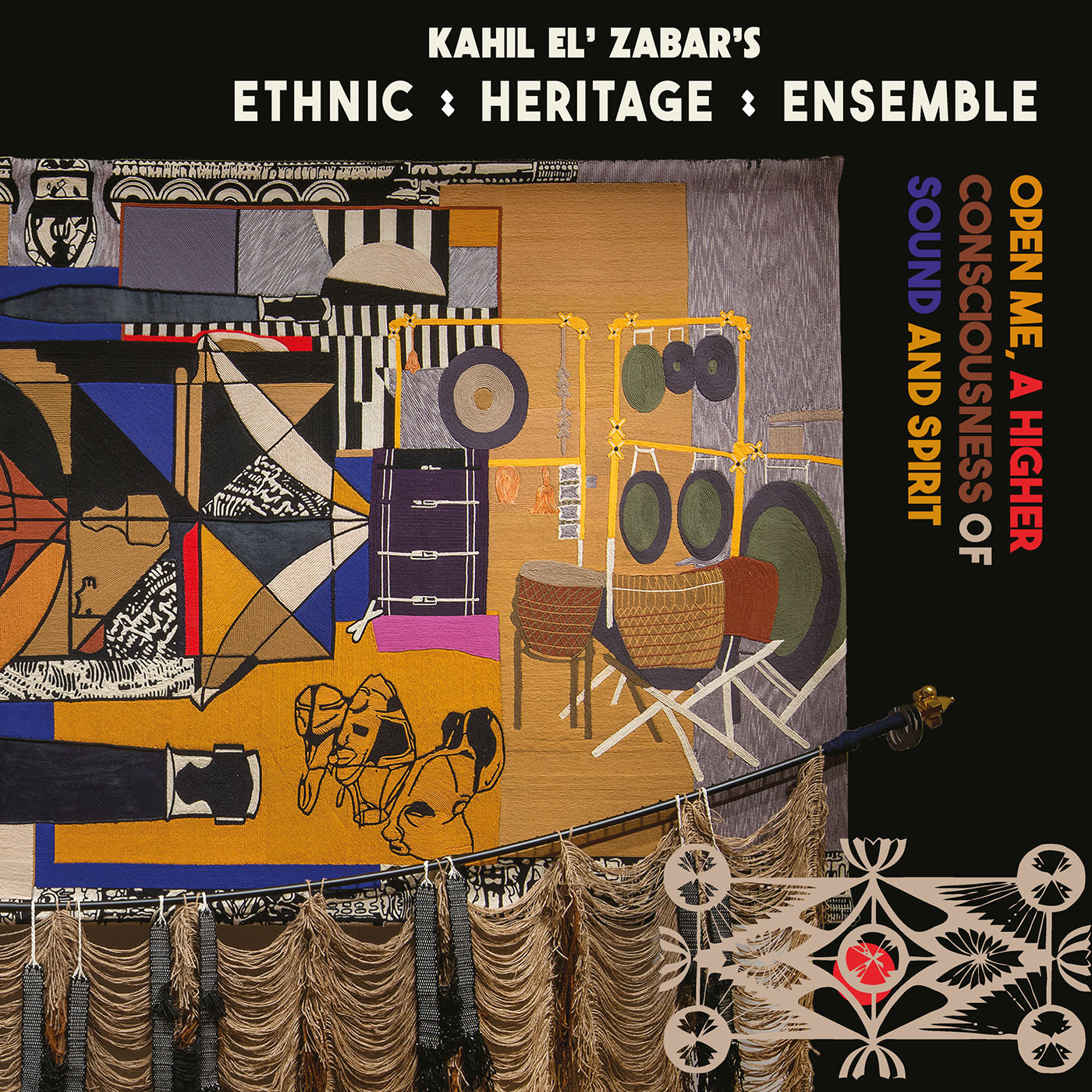‘Open Me’ Liner Notes
by Howard Mandell
For fifty years – since 1974 — Kahil El’Zabar has guided his Ethnic Heritage Ensemble and a world of listeners in musical experiences animated by traditions and projections of African-American culture. The Ethnic Heritage Ensemble has been his signature, though not his only, group endeavor: over the past half-century Kahil has also led his Ritual Trio and Spirit Ensemble, and collaborated in myriad projects with other artists. Yet all his efforts have advanced a singular mission: To celebrate and expand upon the long legacy of Great Black Music, Ancient to the Future, reaching out to engage people, whoever and wherever they may be.
For Open Me, A Higher Consciousness of Sound and Spirit the Ethnic Heritage Ensemble takes new steps towards that goal. To start, it’s become a quintet, with string players James Sanders and Ishmael Ali joining trumpeter Corey Wilkes, baritone saxophonist Alex Harding and, naturally, Kahil, who plays kalimba, trap set, earth drum, clavé sticks, cowbell, blows bird whistles and ocarinas, chants, croons, groans, huffs, urges the proceedings on with his whole being, infusing the music with righteous, infectious energy.

Listen to ‘Open Me’
Kahil El’Zabar’s message
Nep Sidhu’s message
Hear the delicate, beyond-age “thumb piano” figure with which Kahil introduces the still-compelling vamp of Miles Davis’ “All Blues” from Kind of Blue of 1959 — and how Corey Wilkes’ muted trumpet dips into Davis’ classic “Summertime” not as repertoire but genuine re-creation. Join Kahil in the uplift of “The Whole World in His Hands”, a spiritual first published in 1927, known well before then and still enhancing the faith of believers today. Snap to the EHE’s arrangement of pianist McCoy Tyner’s “Passion Dance” – so smart that it justifies the absence of a piano. Get down with “Compared to What,” the proto-rap protest written by soul man Gene McDaniel for songstress Roberta Flack, made most famous via a 1969 Montreux jazz festival performance by pianist Les McCann and Chicago-rooted saxophonist Eddie Harris.
These tracks serve as standards and connectors amid the eight original compositions comprising this rest of this generous album. Corey’s lyricism continues from “All Blues” into “Barundi” as does the compelling tempo Kahil carries over to his full kit, and Sanders, Ali and Harding pick up the lulling, swampy vibe – which they return to in “Can You Find a Place”. On “Whole World” and “What” Kahil’s muscular vocals are accompanied by the band doing just enough, never too much, substantially extending the melodies and sensitively attending to dynamics.
Each Ensemble member stretches out – Sanders slashingly on “Hang Tuff,” over Ali’s deft plucking and El’Zabar’s firm hand-slaps. Harding goes all out on “Kari,” (named for Kahil’s eldest son) and inspires in turn Wilkes, Sanders and Kahil’s powerful drum break.
Wilkes acknowledges his stylistic debts to the late Lester Bowie and repays them in his solos on “Return of The Lost Tribe” (from a collectively organized 1997 album of the same title) and “Great Black Music” – both pieces effectively paeans to the AACM (Association of the Advancement of Creative Musicians) of which Kahil was a president, the influential Art Ensemble of Chicago and its resident composer Roscoe Mitchell.
Revisiting the enduring achievements of our elders is a way mature artists effect the future — so El’Zabar intones “Ornette,” evoking, of course, the man who liberated jazz from hidebound strictures. And virtually everything he does as an independent, multi-dimensional artist happens with thanks to the influence in his childhood of Kelan Phil Cohran, a mentor of Chicago’s entire African-American artistic community and visionary Afrofuturist.
Over five decades the Ethnic Heritage Ensemble has featured a proud lineage of collaborators, starting as a sextet, breaking through as a two-sax and percussion formation originally with Edward Wilkerson, Jr. and Light Henry Huff, later bringing in Kalaparusha Maurice McIntyre, Joseph Bowie, Ernest Dawkins, Fareed Haque and Atu Harold Murray. Kahil and company have been credited as avant-gardists, free jazz players and instigators of acid jazz, among other fanciful descriptions. The truth is that with whomever he’s made music, and with that music taking many forms, Kahil El’Zabar has stood tall and strong as an artist creating from deep and broad knowledge of what’s come before, and significant insight into how it resonates now. Open Me is about the present, abandoning nothing of precedence and denying nothing that may yet arise. So because of the Ethnic Heritage Ensemble’s five-decade history and regardless of it, this album resounds with currency that may well be eternal. All that’s left is to pay heed to its title. For a higher consciousness of sound and spirit, Open Me, now.
– Howard Mandel
Kahil El’Zabar’s
Ethnic Heritage Ensemble
‘Open Me, A Higher Consciousness of Sound and Spirit’ is a new Ethnic Heritage Ensemble sound, constantly shifting gears and tempos in a jazz-blues continuum, in perpetual spontaneity, combining their meaningful music history with an innovative approach to arrangements, performance and improvisation.

